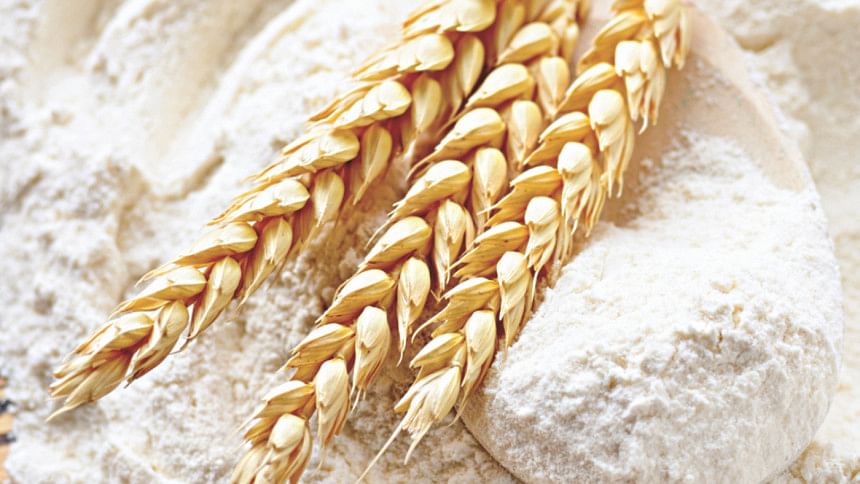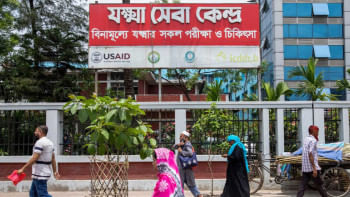Wheat Procurement: Importers reach out to farmers

Amid high demand for wheat in the local market, the government's procurement programme is failing to attract local growers, who witnessed a better yield this year.
Wheat importers, through local traders, have turned to the country's wheat farmers to buy the crop, often beating the government by offering competitive prices and easier procurement terms.
On April 15, the Directorate General (DG) of Food began to locally purchase 75,000 tonnes of wheat, which is only six percent of this year's production estimated at 12.45 lakh tonnes by the Department of Agricultural Extension.
Like last year, the government's procurement price has been fixed at Tk 28 per kg, whereas farmers are getting a price as high as Tk 30 per kg of wheat from private buyers.
In ten days till April 24, the government managed to buy only 84 tonnes, according to the Directorate General of Food.
Md Anisuzzaman, director, procurement division of the DG of Food, said private entrepreneurs usually rely on imports but now they are collecting wheat from the local market with competitive prices.
While farmers are struggling to find labour and transport to bring their wheat for sale to government depots because of the shutdown, the private buyers are collecting the grain right from farmers' doorsteps.
"The import has reduced by 80 percent, so we have become interested in local wheat," Hasan Ali, a flour mill owner of Thakurgaon, said.
Private buyers are providing cash to local traders in advance for collecting wheat from local markets, traders say.
"Import of wheat will remain less for some time over the coronavirus situation. We're buying to avoid future crisis," said Md Khademul Islam, a wheat trader of Boda bazar in Panchagarh.
Md Israil Hossain, director General of Bangladesh Wheat and Maize Research Institute (BWMRI), warned, "Any failure in the government procurement [of wheat] might not be a good thing this year."
"If private buyers fear less import due to the corona situation, the government's import is going to face the same impact. In that case, creating food storage based on the local market will be wise," he said.
The country is dependent on wheat import as it produces only around 18 percent of its total annual demand of 70 lakh tonnes. This year's production covers only 17.78 percent of the demand, Md Israil told The Daily Star.
FARMERS' ACCOUNT
Most farmers are not even aware of government procurement in Jhenaidah, where wheat is selling at Tk 30 per kg -- Tk 2 more than the government price.
"I don't know whether the government is buying, neither do I have any interest to know. Buyers are coming directly to my crop field. They are offering good prices," said Arman Ali, a grower of Enayetpur village of Jhenaidah's Kaliganj upazila.
Wheat grower Amzad Hossain of Thakurgaon district's Farabari village finds the government procurement process cumbersome.
To procure wheat, the government selects farmers through a lottery and then asks for 14 percent moisture in the crop, which sometimes becomes impossible to maintain, he said.
"We lose around three kilogram of wheat per maund [1 maund = 40kg] to maintain the moisture level," Amzad said, explaining that the crop weighs less as it loses moisture.
Private buyers do not impose any moisture content requirement, he added.
Farmers also incur transportation cost to take their produce to the government depots, he said.
Unlike private buyers, who pay upfront, government officials provide a procurement certificate that farmers have to present at banks to collect payments, he added.
Md Samsuzzoha, a grower of Boda upazila in Panchagarh district, produced 28 maunds of wheat from 0.67 acres of his land this season and sold a portion of his crops at Tk 26 per kg.
"I got cash immediately as soon as I harvested. It is not possible at government depots," he said.
Wheat grower Md Shamsuddin of Rajshahi's Tanore upazila finds the government's price for wheat satisfactory since this year his production cost for 37.5 maunds of the crop from one acre of his land was Tk 17 per kg.
He, however, said for sharecroppers the government price is low, explaining that had he leased the land his production cost would have been Tk 27 per kg.
In that case, the government price would not be satisfactory, he said.
However, this year the market price for wheat is higher than last year's Tk 20 per kg, which was Tk 8 less than the 2019 government price, he said.
Despite a higher wheat price, Shamsuddin was yet to sell his crop, hoping that the price will further increase in the coming months.
SHOULD GOVT INCREASE PRICE?
Food procurement boss Md Anisuzzaman opines that the government price for wheat, fixed following necessary market assessment, should not be increased.
"We usually keep the price Tk 8 to Tk 10 more than the market price to support farmers. But this year, we feel farmers do not require price support," he said.
"Our assessment says any increase from the fixed price may leave the market unstable", he added.
An increase in government price will push the price of wheat further up in the market then flour consumers will have to pay more, he explained.
Talking to The Daily Star on April 24, he said they were yet to conclude that this year's wheat procurement is set to face a failure.
"We have time up to June for procurement. If the coronavirus situation improves by that time, private buyers will move toward import and farmers will be interested at the government rate," he hoped.
WHEAT PRODUCTION
Wheat is sown in November-December and harvested in March-April.
This year wheat yield -- production per hectare of land -- has been higher than the last six years'.
This year's rate of 3.64 tonnes per hectare was achieved because of a prolonged winter and distribution of draught and blast disease tolerant seeds, said Md Abdul Muyeed, director general, the Department of Agricultural Extension.
Besides, wheat has been cultivated in more land than last year's as many Boro farmers also moved to wheat cultivation after incurring loss in paddy farming, he said.
[Azibor Rahman from Jhenaidah, Ahmed Humayun Kabir Topu from Pabna and Rabiul Hasan from Chapainawabganj contributed to the report]


 For all latest news, follow The Daily Star's Google News channel.
For all latest news, follow The Daily Star's Google News channel. 



Comments